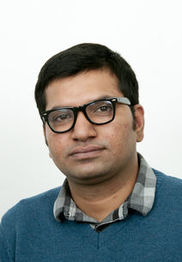
Dr. Razak Khan
Former Research Fellow
Email:
razak.khan[at]cemis.uni-goettingen.de
Address:
Waldweg 26
37073 Göttingen
Deutschland
Career
Dr. Razak Khan is a Research Fellow in the ERC consolidator grant project “Democratising the Family? Gender Equality, Parental Rights, and Child Welfare in Contemporary Global History” (DEMFAM) at Department of History, Free University,Berlin. He was awarded a DPhil from the Berlin Graduate School Muslim Cultures and Societies (BGSMCS), Freie Universität Berlin in 2014. Subsequently, he was a postdoctoral fellow at the Centre for the History of Emotions at the Max Planck Institute for Human Development in Berlin (2014–2015), and at The Erlangen Centre for Islam and Law in Europe (EZIRE) at Friedrich–Alexander University Erlangen–Nürnberg (2019). He has been affiliated with The Centre for Modern Indian Studies, Goettingen University (2015–2024) where he is finishing his Habilitation project “Minor Cosmopolitanism: Islam, Urdu, and Emotional Integration in the Life and Writings of Syed Abid Husain (1896–1978).” His first book, Minority Pasts: Locality, Emotions, and Belonging in Rampur was published by Oxford University Press, in 2022. He has also edited The Incomparable Festival. Penguin Black Classics,2021 and Nodes of Translation: Intellectual History between Modern India and Germany. De Gruyter, 2024.
He is now working on a new research project “Unfamiliar: Family, Law, and Democracy in South Asia.” The project explores colonial genealogies and postcolonial trajectories of debates around minorities and family law in India, Pakistan and Bangladesh. It looks at the intersection of religion, gender and sexual minorities and family law on the issues of marriage, adoption and inheritance. His wider research interests include early modern and modern Indian history, South Asian Islam and Muslim cultures, Urdu public cultures, affect and archives, comparative Indo-German histories, history of emotions and experience, global intellectual and legal history.
Publications
“Muslim Household, Nation and Urdu in Television Dramas in Pakistan”. South Asia 46, 3 (2023): pp. 521–538.
“Entanglements in the Colony: Jewish-Muslim Connected Histories in Colonial India”. Modern Asian Studies 56, 6 (2022): pp. 1845–1871.
“Place of Knowledge: Education and Urban History in Rampur”. Max Weber Stiftung India Branch Office and GHI London Education and the Urban in India | Working Paper Series 2021/8.
“Introduction: Minor Cosmopolitanisms: Institutions, Intellectuals and Ideas between India and
Germany”. Comparative Studies in South Asia, Africa, and the Middle East 40, 2 (2020): pp. 291–294. https://doi.org/10.1215/1089201X-8524215.
“Entanglements of Translation: Psychology, Pedagogy and Youth Reform in German and
Urdu”. Comparative Studies in South Asia, Africa, and the Middle East 40, 2 (2020): pp. 295–308. https://doi.org/10.1215/1089201X-8524226.
“Iqbal, German Orientalism and Making of Modern Mysticism”. TRAFO — Blog for Transregional Research Series “40 Years After Orientalism”, Berlin, 03.08.2020. Available at https://trafo.hypotheses.org/24680.
“Knowledge in Transit: Global Encounters and Transformation in Magnus Hirschfeld´s Travelogue”. History of Knowledge Blog, 06.11.2019 (updated 23.08.2024). https://historyofknowledge.hypotheses.org/13116.
“A Festival Extraordinaire: An Indo-Islamic Poem”. Poetry in the Indo-Islamic Millennium Blog, 24.02.2019.
with Edgar Cabanas & Jani Marjanen: “Travelers: Transformative Journeys and Emotional Contacts”. In: Gammerl, Benno, Philipp Nielsen & Margit Pernau (eds.), Encounters with Emotions: Negotiating Cultural Differences since Early Modernity. New York/Oxford: Berghahn Books, 2019, pp. 61–84.
“South Asian Students in Berlin during World War I and the Interwar Period”. MIDA Thematic Resources (2019). https://doi.org/10.25360/01–2022–00044.
“Documents Related to KM Ashraf in the Horst Krüger Collections at Leibniz-Zentrum Moderner Orient, Berlin”. MIDA Thematic Resources (2019). https://doi.org/10.25360/01–2022–00043.
“Entanglements in Colony”. Book Review of Elite Germans in India by Panikos Panayi. German Historical Institute London Bulletin XL, 2 (November 2018): pp. 107–111. https://doi.org/10.15463/rec.1121040329.
“Princely Architectural Cosmopolitanism and Urbanity in Rampur”. Global Urban History Blog, 05.08.2017. Available at https://globalurbanhistory.com/2017/08/03/princely-architectural-cosmopolitanism-and-urbanity-in-rampur/.
“Poetic Sovereignty”. Book Review of Attendant Lords: Bairam Khan and Abdur Rahim, Courtiers and Poets in Mughal India by T. C. A. Raghavan. Biblio: A Review of Books (Oktober-Dezember 2017).
“Rethinking „National Culture“ of India: An Entangled Indo-German Intellectual History”. TRAFO – Blog for Transregional Research, 16.01.2017 (updated 08.12.2022). Available at https://trafo.hypotheses.org/5729.
“The Social Production of Space and Emotions in South Asia”. Journal of Economic and Social
History of the Orient 58, 5 (2015): pp. 611–633.
“Local Pasts: Space, Emotions and Identities in Vernacular Histories of Princely Rampur”. Journal of the Economic and Social History of the Orient 58, 5 (2015): pp. 693–731.
“The Case of Falling Walls: Politics of Demolition and Preservation in Rampur”. Economic and
Political Weekly XLIX, 12 (22.03.2014) Web exclusive. Republished in EPW 49, 20 (17.05.2014): pp. 25–28.
“Recovering Minority Pasts: New Writings on Muslims in South Asia”. Südasien-Chronik – South Asia Chronicle 5 (2015): pp. 375–397. https://doi.org/10.18452/17973.
“Rethinking Muslim Politics: The Rampuri Experience”. Economic and Political Weekly 44, 25 (20.06.2009): pp. 16–18.
